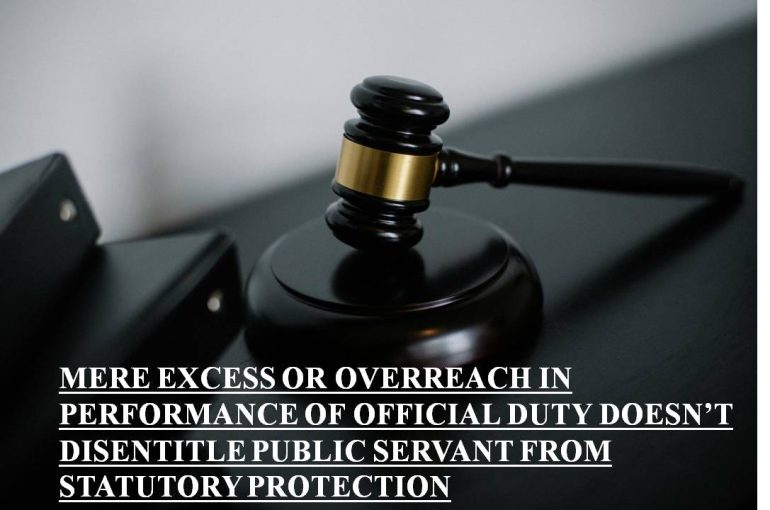MERE EXCESS OR OVERREACH IN PERFORMANCE OF OFFICIAL DUTY DOESN’T DISENTITLE PUBLIC SERVANT FROM STATUTORY PROTECTION
 The Hon’ble Supreme Court recently in the case of G.C. Manjunath & Ors. v. Seetaram (Criminal Appeal No. 1759 of 2025), had discussed the issue of whether public servants, especially police personnel, are entitled to statutory protection under Sec 197 of the CrPC and Sec 170 of the Karnataka Police Act when their act surpassed the scope of their official duties.
The Hon’ble Supreme Court recently in the case of G.C. Manjunath & Ors. v. Seetaram (Criminal Appeal No. 1759 of 2025), had discussed the issue of whether public servants, especially police personnel, are entitled to statutory protection under Sec 197 of the CrPC and Sec 170 of the Karnataka Police Act when their act surpassed the scope of their official duties.
Facts of the Case:
The Appellants, who were police officials, were accused of assaulting the Complainant Respondent Seetaram, during the course of an investigation conducted by the police. The Complainant had accused that the police officials used excessive force and caused severe injuries to him. Initially, Seetaram filed a complaint, and the issue of whether the police officials were acting within their official duties or had exceeded the scope of their duties came into light. When the matter reached the High Court of Karnataka, it was held that the police official’s actions exceeded their official duties requirements and consequently ruled that they were not at all entitled to the statutory protection under Sec197 of CrPC and Sec 170 of the Karnataka Police Act. The Court held that there is no prior need for a sanction to prosecute the said officers.
Subsequently, the matter reached the Apex Court, wherein the Police Officials Appellants, filed an appeal which challenged the Karnataka High Court’s ruling, pleading that they were entitled to the statutory protection under both the Police Act and the CrPC, even if they had exceeded their authority, as long as their act was connected to the duties assigned to them officially.
Issues before the Supreme Court:
- Whether police officials are entitled to statutory protection under Sec197 of the CrPC and Sec 170 of the Karnataka Police Act when their actions exceed the scope of their official duties?
- Whether a prior sanction for prosecuting the police officials was required in this matter, despite the said accusation for the use of force being excessive?
Analysis by the Supreme Court:
The Statutory Protection (Sections 197 CrPC and 170 Karnataka Police Act): The said statutory sections from both the CrPC and the State Police Act provides for protection to public servants, including police officials, from prosecution for the acts done in the functioning of their official duties, unless there has been a sanction granted in prior. The interesting issue was whether the said statutory protection extends when the officials work beyond the scope of their official duties but still linked with their official functions.
It is pertinent to note that the Court acknowledged that public servants, particularly police officers, have a nature of work wherein at times they surpass their authority while performing their duties. However, the Court ruled that such excessive force or overreach should not by itself debar them from the protection under the law if there is a reasonable interlink between their acts and their official duties. The determining factor for being entitled to statutory protection was whether the actions done by the police officials had any link to their official duties. Even though their acts may have been in excessive of their authority, they were still be seen to be committed in the course of their official duties.
Ratio Decidendi:
The Apex Court emphasized the value of the reasonableness of the actions in question. It held that the mere fact that the officers exceeded their powers or acted improperly did not disqualify them from the statutory protection, provided their actions were reasonably connected to their official functions.
The Court noted that the protection under Sec197 of the CrPC and Sec 170 of the Karnataka Police Act isn’t limited to actions done strictly within the domains of authority but even extends to actions which are reasonably interlinked to the performance of their official duties. This means that even if the officials acted in a way which exceeds the scope of their official authority, they could still be safeguarded from prosecution if their actions had a clear interlinking to their duties. The Court also mentioned previous cases where it had been established that the statutory protection is for shielding the public officials from harassment and unnecessary prosecution for actions that are incidental to their duties, even if those acts are committed in excess of their defined official duties. The Court came to a conclusion in this case, the police officials were entitled to protection under the law, and therefore, there was a statutory prior sanction required for them to be prosecuted under the law.
Conclusion:
The judgement of the Karnataka High Court got overruled by the Hon’ble Supreme Court, holding that the police officials were entitled to statutory protection under Sec 197 of the CrPC and Sec 170 of the Karnataka Police Act. The Court held that even though the officers’ actions might have been excessive, they were still connected to their official duties, and as such, they required prior sanction for prosecution.
The Court’s judgment brought about the principle that public servants, including police officials, are generally entitled to protection under the law when their acts are linked to the discharge of their official duties, even if there is a deviation in their conduct. This judgment brings a light on the balance that the judicial system sought to strike between protecting public officials from frivolous prosecution and ensuring answerability when their acts travel beyond what is reasonably justified or lawful.
SARTHAK KALRA
Senior Legal Associate
The Indian Lawyer and Allied Services





































Leave a Reply